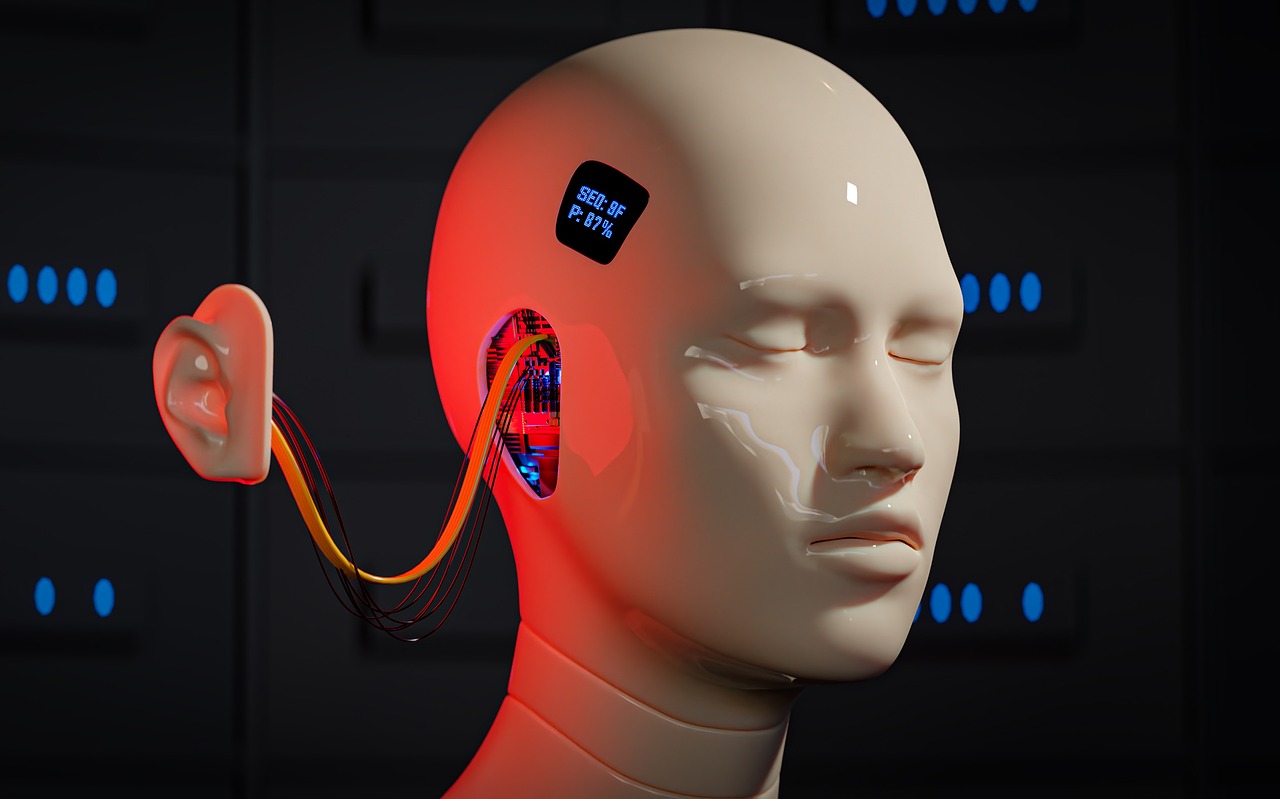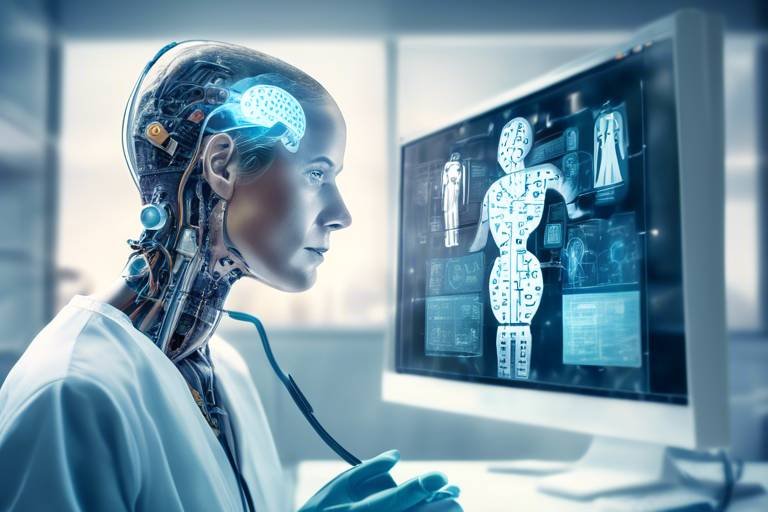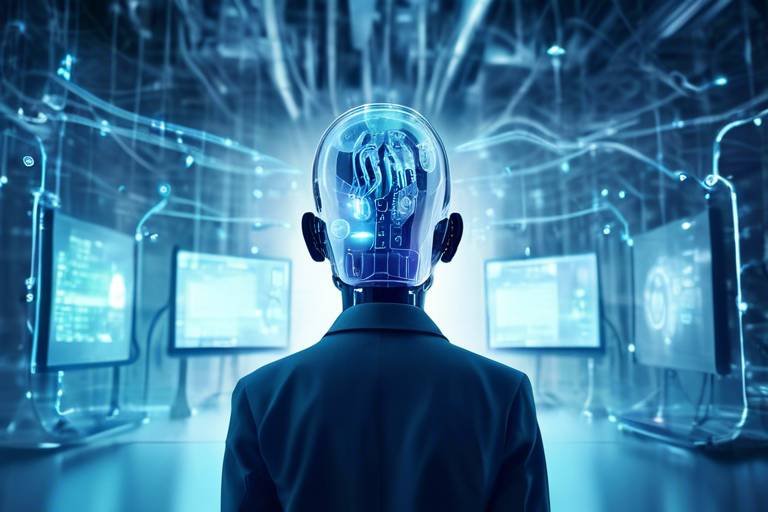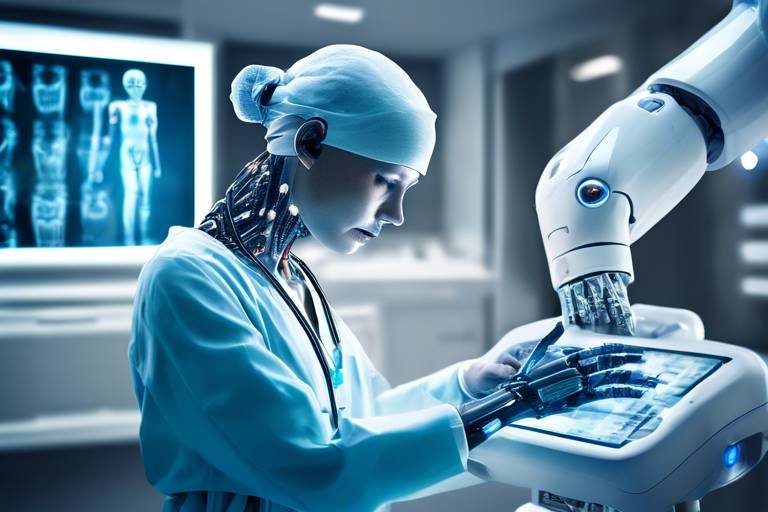Artificial Intelligence: A Paradigm Shift in HealthCare
In recent years, artificial intelligence (AI) has emerged as a game-changer in the healthcare sector, transforming how we diagnose, treat, and manage diseases. Imagine a world where healthcare is not just reactive but proactive, where treatments are tailored specifically to you, and where the burden on healthcare professionals is significantly reduced. This is not science fiction; this is the reality that AI is bringing to the forefront of healthcare. With its ability to analyze vast amounts of data quickly and accurately, AI is paving the way for a future where patient care is more efficient, personalized, and effective than ever before.
The integration of AI into healthcare is akin to adding a powerful engine to a car; it enhances performance and opens up new possibilities. From diagnostic tools that can identify diseases at their earliest stages to personalized medicine that tailors treatment plans to individual patients, the applications of AI are both exciting and transformative. The healthcare industry is on the brink of a revolution, and AI is at the helm, steering us towards improved patient outcomes and operational efficiency.
One of the most significant impacts of AI in healthcare is its ability to analyze and interpret data. With the explosion of health data generated from electronic health records, wearable devices, and genomic sequencing, healthcare providers are inundated with information. AI algorithms can sift through this data at lightning speed, identifying patterns and insights that humans might miss. This capability not only speeds up the diagnostic process but also enhances accuracy, leading to better treatment decisions and outcomes.
However, while the potential of AI in healthcare is immense, it is essential to approach its implementation thoughtfully. There are challenges to address, such as data privacy concerns and the need for regulatory frameworks. As we embrace this technological advancement, we must ensure that ethical considerations are at the forefront of our minds. After all, the goal of AI in healthcare is not just to improve efficiency but to enhance the quality of care for patients.
As we continue to explore the transformative impact of AI on healthcare, it is crucial to recognize that this is just the beginning. The future holds even more promise, with advancements in AI technologies likely to lead to breakthroughs that we can only dream of today. The journey ahead is filled with possibilities, and as we navigate this paradigm shift, one thing is clear: AI is not just a tool; it is a partner in our quest for better health.
- What is artificial intelligence in healthcare?
Artificial intelligence in healthcare refers to the use of algorithms and software to analyze complex medical data, enhancing decision-making and improving patient outcomes.
- How does AI improve diagnostics?
AI improves diagnostics by enabling faster and more accurate disease detection through advanced imaging and data analysis.
- What are the challenges of implementing AI in healthcare?
Challenges include data privacy concerns, the need for regulatory frameworks, and the necessity for training healthcare professionals in new technologies.
- Will AI replace healthcare professionals?
No, AI is designed to assist healthcare professionals by providing tools and insights, not to replace them.

The Role of AI in Diagnostics
Artificial Intelligence (AI) is not just a buzzword; it's a game-changer in the field of diagnostics. Imagine a world where diseases are detected faster and more accurately than ever before. This is becoming a reality as AI technologies are revolutionizing the way healthcare professionals diagnose illnesses. With advanced imaging techniques and data analysis, AI is improving patient outcomes while simultaneously reducing the burden on healthcare providers. How does it do this? Well, let's dive into the details!
One of the most significant ways AI impacts diagnostics is through advanced imaging technologies. Traditional methods of diagnosis can be time-consuming and often rely heavily on the expertise of individual healthcare professionals. However, AI algorithms can analyze medical images—like X-rays, MRIs, and CT scans—at lightning speed, identifying anomalies that might be missed by the human eye. For instance, AI systems can detect early signs of conditions such as cancer or cardiovascular diseases, allowing for quicker interventions that can save lives.
Moreover, AI's capability to process vast amounts of data means it can synthesize information from various sources, including patient history, lab results, and genetic data. This holistic approach not only enhances the accuracy of diagnoses but also provides healthcare professionals with a comprehensive view of the patient's health. In fact, studies have shown that AI can outperform human experts in specific diagnostic tasks, leading to a new era of precision medicine.
Consider the following table that illustrates the differences in diagnostic accuracy between traditional methods and AI-powered diagnostics:
| Diagnostic Method | Accuracy Rate | Time Taken |
|---|---|---|
| Traditional Imaging | 85% | Hours to Days |
| AI-Powered Imaging | 95% | Minutes |
This table clearly demonstrates that AI not only enhances diagnostic accuracy but also significantly reduces the time taken to reach a diagnosis. This is crucial in emergency situations where every second counts. For instance, in cases of stroke, rapid diagnosis can lead to immediate treatment, drastically improving patient outcomes.
However, it's not just about speed and accuracy. AI also plays a vital role in reducing the workload for healthcare professionals. By automating routine diagnostic tasks, AI frees up valuable time for doctors and nurses, allowing them to focus on patient care rather than administrative duties. This shift can lead to a more efficient healthcare system where patient satisfaction and care quality are significantly improved.
As we look to the future, the role of AI in diagnostics is only expected to grow. With ongoing advancements in machine learning and data analytics, we can anticipate even more sophisticated tools that will enhance diagnostic capabilities. Imagine a world where AI not only assists in diagnosis but also predicts potential health issues before they even arise! This proactive approach could transform healthcare from a reactive model to a preventive one.
In conclusion, the integration of AI into diagnostics is a monumental step forward in healthcare. It enhances accuracy, speeds up the diagnostic process, and alleviates the workload on healthcare professionals. As we continue to explore the potential of AI, the future of diagnostics looks not only promising but revolutionary.
- What types of diseases can AI help diagnose? AI can assist in diagnosing various conditions, including cancers, cardiovascular diseases, and neurological disorders.
- How does AI improve the accuracy of diagnostics? AI analyzes large datasets and medical images, identifying patterns and anomalies that may be missed by human experts.
- Are there any risks associated with AI diagnostics? Yes, there are concerns about data privacy, algorithm bias, and the need for regulatory frameworks to ensure safe implementation.
- Will AI replace healthcare professionals? No, AI is designed to assist healthcare professionals, not replace them. It enhances their capabilities and allows for more focused patient care.

AI in Personalized Medicine
The healthcare landscape is undergoing a revolutionary transformation, and at the forefront of this change is artificial intelligence (AI). One of the most exciting applications of AI is in the realm of personalized medicine. This innovative approach tailors medical treatment to the individual characteristics of each patient, moving away from the traditional one-size-fits-all model. Imagine a world where your treatment plan is as unique as your DNA; that’s the promise of personalized medicine powered by AI.
At its core, personalized medicine leverages AI to analyze vast amounts of patient data, including genetic information, lifestyle choices, and environmental factors. By doing so, it enables healthcare providers to craft customized treatment plans that optimize therapeutic effectiveness while minimizing adverse effects. For instance, consider a patient diagnosed with cancer; instead of a standard chemotherapy regimen, AI can help identify the most effective drugs and dosages based on the patient’s unique genetic profile. This not only enhances the likelihood of successful treatment but also significantly reduces the risk of harmful side effects.
AI algorithms are capable of sifting through enormous datasets, identifying patterns and correlations that would be impossible for humans to discern. These algorithms can create tailored treatment plans that consider various factors, such as:
- Genetic predispositions: Understanding a patient’s genetic makeup can help predict how they will respond to certain medications.
- Environmental influences: Factors like exposure to toxins or lifestyle choices can significantly impact health outcomes.
- Comorbid conditions: AI can assess the interplay of multiple health conditions to devise a holistic treatment strategy.
This data-driven approach not only enhances the precision of treatments but also fosters a more engaged patient experience. When patients see that their treatment is tailored to their specific needs, it increases their trust in the healthcare system and encourages adherence to the prescribed therapies.
Another fascinating aspect of AI in personalized medicine is its ability to utilize predictive analytics. By analyzing historical data, AI can forecast potential patient outcomes based on various treatment paths. This foresight allows healthcare providers to intervene proactively, adjusting treatment plans as necessary to improve overall care quality. For example, if predictive analytics indicate a high likelihood of complications from a particular treatment, doctors can pivot to alternative strategies before issues arise.
AI systems also enable real-time monitoring of patient health, which is crucial for personalized medicine. With wearable devices and mobile health applications, patients can continuously track their vital signs and symptoms. AI can analyze this data instantaneously, allowing healthcare providers to make timely adjustments to treatment protocols. This level of responsiveness is akin to having a personal health assistant who is always on call, ready to adapt your care based on your current condition.
In summary, AI in personalized medicine is not just a trend; it represents a paradigm shift in how healthcare is delivered. By harnessing the power of data, AI is paving the way for more effective, individualized treatment strategies that promise to enhance patient outcomes significantly. As we continue to embrace this technology, the future of healthcare looks brighter and more tailored than ever.
- What is personalized medicine?
Personalized medicine is an approach to medical treatment that tailors therapies to individual characteristics, such as genetics, lifestyle, and environment. - How does AI contribute to personalized medicine?
AI analyzes large datasets to identify patterns and create customized treatment plans, enhancing the effectiveness of therapies. - What are the benefits of personalized medicine?
Benefits include improved treatment effectiveness, reduced side effects, and more engaged patients. - Are there challenges in implementing AI in personalized medicine?
Yes, challenges include data privacy concerns, the need for regulatory frameworks, and training for healthcare professionals.

Data-Driven Treatment Plans
In the ever-evolving landscape of healthcare, are emerging as a game-changer. Imagine a world where your treatment is not just a one-size-fits-all approach but is instead tailored specifically to you. This is the promise of artificial intelligence (AI) in crafting personalized treatment strategies. By analyzing a vast array of data—from genetic information to lifestyle choices—AI algorithms can create customized plans that optimize drug selection and dosages. This means that instead of relying on generalized protocols, healthcare providers can offer treatments that consider the unique characteristics of each patient.
Think of it this way: just as a chef curates a menu based on seasonal ingredients and personal tastes, healthcare professionals can now design treatment plans that resonate with the individual needs of their patients. This level of personalization not only enhances the effectiveness of therapies but also minimizes the risk of adverse effects, making the entire treatment process smoother and more efficient.
To illustrate the impact of data-driven treatment plans, consider the following table that highlights some key factors that AI takes into account when formulating these customized strategies:
| Factor | Description |
|---|---|
| Genetic Information | Analyzes genetic markers to predict drug response and potential side effects. |
| Environmental Factors | Considers external influences such as pollution and lifestyle choices that affect health. |
| Medical History | Reviews past medical records to identify patterns that could inform treatment decisions. |
| Current Medications | Evaluates existing prescriptions to avoid harmful drug interactions. |
Furthermore, the integration of AI in creating these treatment plans is not just about the present; it’s also about the future. With the help of predictive analytics, healthcare providers can foresee potential outcomes and adjust treatment plans proactively. This is akin to a skilled navigator who anticipates changes in weather patterns to ensure a safe journey. By leveraging AI, healthcare professionals can intervene before complications arise, ultimately leading to improved patient outcomes.
Moreover, real-time monitoring plays a crucial role in the success of data-driven treatment plans. AI systems can continuously assess patient health, providing immediate feedback that allows for timely adjustments in treatment protocols. This dynamic approach ensures that care is not static but evolves in response to the patient’s changing condition, much like a gardener who adjusts watering schedules based on the weather and the growth of plants.
In conclusion, data-driven treatment plans powered by AI represent a significant leap forward in personalized healthcare. By embracing this technology, we are not just improving the efficacy of treatments; we are fundamentally transforming the patient experience. As we continue to harness the power of AI, the future of healthcare looks brighter, more personalized, and ultimately more effective.
- What is a data-driven treatment plan? A data-driven treatment plan is a customized healthcare strategy created using AI algorithms that analyze various data points unique to each patient.
- How does AI improve treatment effectiveness? AI enhances treatment effectiveness by tailoring therapies based on individual genetic, environmental, and lifestyle factors, ensuring a more personalized approach.
- Are there risks associated with AI in healthcare? Yes, there are challenges such as data privacy concerns and the need for regulatory frameworks, but the benefits often outweigh these risks.

Predictive Analytics for Patient Outcomes
Imagine walking into a doctor's office and feeling like your healthcare provider already knows you inside out—your medical history, your lifestyle, and even your genetic predispositions. This is the power of predictive analytics in healthcare, a game-changing approach that uses data to anticipate patient outcomes and tailor interventions accordingly. By harnessing the vast amounts of data generated in healthcare settings, predictive analytics allows providers to foresee potential complications and respond proactively, ultimately enhancing the quality of care.
At its core, predictive analytics involves the use of sophisticated algorithms that analyze historical and real-time data. These algorithms can identify patterns and trends that might not be immediately apparent to human eyes. For instance, a predictive model might analyze a patient’s previous health records, lab results, and even their social determinants of health to predict the likelihood of conditions such as diabetes or heart disease. This kind of insight can be invaluable in crafting personalized treatment plans that not only address current health issues but also prevent future ones.
One of the most exciting aspects of predictive analytics is its ability to improve patient engagement. When patients are informed about their health risks based on data-driven insights, they are more likely to take an active role in their healthcare decisions. This collaborative approach can lead to better adherence to treatment plans, healthier lifestyle choices, and ultimately, improved health outcomes. For example, if a patient learns they are at a higher risk for hypertension, they may be more motivated to monitor their blood pressure regularly and make dietary changes.
Moreover, predictive analytics can significantly enhance operational efficiency within healthcare systems. By predicting patient needs, hospitals can optimize resource allocation, manage staff schedules, and reduce wait times. For instance, if data indicates a spike in flu cases during a particular season, healthcare facilities can prepare by increasing staffing levels and stocking up on necessary supplies. This not only improves the patient experience but also alleviates the strain on healthcare professionals.
However, while the benefits of predictive analytics are substantial, there are challenges to consider. Data quality is paramount; inaccurate or incomplete data can lead to misguided predictions and potentially harmful outcomes. Furthermore, integrating predictive analytics into existing workflows requires training and a cultural shift within healthcare organizations. It's crucial for healthcare providers to embrace these tools, ensuring they are used ethically and effectively.
In conclusion, predictive analytics represents a remarkable leap forward in the quest for personalized healthcare. By leveraging data to foresee patient outcomes, healthcare providers can intervene proactively, enhancing both individual and population health. As technology continues to evolve, the potential for predictive analytics to transform healthcare is not just a possibility; it's an exciting reality that is already unfolding.
- What is predictive analytics in healthcare? Predictive analytics in healthcare refers to the use of data analysis techniques to predict future patient outcomes based on historical and real-time data.
- How does predictive analytics improve patient care? By anticipating potential health risks and outcomes, predictive analytics allows healthcare providers to tailor treatment plans and interventions, ultimately leading to better patient engagement and outcomes.
- What are the challenges of implementing predictive analytics? Challenges include ensuring data quality, integrating analytics into existing workflows, and training healthcare professionals to use these tools effectively.
- Is patient data privacy a concern with predictive analytics? Yes, data privacy is a significant concern, and it is essential for healthcare providers to adhere to strict regulations to protect patient information.

Real-Time Monitoring and Adjustments
In the rapidly evolving landscape of healthcare, real-time monitoring powered by artificial intelligence is proving to be a game-changer. Imagine having a personal health assistant that never sleeps, tirelessly analyzing your health data and providing insights that could save your life. That's the promise of AI in real-time monitoring! By integrating wearable technology and smart devices, healthcare providers can track patients' vital signs, activity levels, and even their emotional well-being in real time. This constant stream of data allows for immediate adjustments to treatment plans, ensuring that patients receive the most effective care tailored to their current condition.
For instance, consider a patient with diabetes. With AI-enabled continuous glucose monitors, doctors can receive alerts if a patient's blood sugar levels fluctuate unexpectedly. This capability allows for quick intervention, whether it’s adjusting insulin doses or providing dietary recommendations. It’s like having a safety net that catches you before you fall, providing both patients and healthcare providers with the peace of mind that comes from knowing that help is just a heartbeat away.
Moreover, the integration of AI in real-time monitoring doesn't just enhance individual patient care; it also improves overall healthcare efficiency. By analyzing data trends, AI can predict potential health issues before they manifest into serious problems. For example, if the system detects a pattern indicating that a patient is at risk of developing heart complications, it can notify healthcare professionals to take proactive measures. This predictive capability can significantly reduce hospital readmissions and improve long-term health outcomes.
However, implementing these AI systems comes with its own set of challenges. The technology requires robust infrastructure and reliable data sources to function effectively. Healthcare providers must invest in both hardware and software solutions to ensure that the data collected is accurate and actionable. Furthermore, training staff to interpret AI-generated insights is crucial. Without proper training, the potential of these systems could be underutilized, leading to missed opportunities for patient care improvements.
In summary, real-time monitoring and adjustments through AI not only enhance patient safety and treatment efficacy but also align with the broader goal of personalized medicine. As we continue to embrace technological advancements, the healthcare industry stands on the brink of a revolution that promises better health outcomes for all. The future is bright, and with AI at the helm, we can look forward to a more responsive and effective healthcare system.
- What is real-time monitoring in healthcare?
Real-time monitoring refers to the continuous observation of a patient's health data through advanced technologies, allowing for immediate adjustments in treatment based on current conditions. - How does AI enhance real-time monitoring?
AI processes vast amounts of data quickly, identifying trends and anomalies that can alert healthcare providers to potential issues before they escalate. - What are the benefits of real-time monitoring for patients?
Patients benefit from personalized care, timely interventions, and improved health outcomes, as their treatment plans can be adjusted based on real-time data. - Are there challenges in implementing AI for real-time monitoring?
Yes, challenges include the need for significant investment in technology, data privacy concerns, and the necessity for training healthcare professionals to effectively use AI tools.

AI in Clinical Decision Support
Artificial Intelligence is dramatically reshaping the landscape of clinical decision support systems (CDSS). Imagine a world where healthcare professionals are equipped with a digital assistant that never tires, constantly analyzes data, and provides insights in real-time. This is not science fiction; it’s the reality that AI brings to the table. By harnessing the power of AI, clinicians can access evidence-based recommendations that enhance their decision-making processes, thereby improving patient outcomes.
One of the most significant advantages of AI in clinical decision support is its ability to process vast amounts of data at lightning speed. Traditional decision-making often relies on a clinician's experience and knowledge, which, while invaluable, can be limited. AI, on the other hand, can analyze thousands of medical studies, patient records, and clinical guidelines in mere seconds. This capability allows for a more comprehensive understanding of a patient's condition, leading to better-informed decisions.
Moreover, AI can help reduce the incidence of medical errors, which are a significant concern in healthcare. By providing alerts about potential drug interactions, allergies, or deviations from clinical guidelines, AI systems serve as a second pair of eyes for healthcare professionals. This not only enhances patient safety but also boosts the confidence of clinicians in their decision-making abilities. For instance, consider a scenario where a doctor prescribes a medication that could potentially interact with a patient’s existing prescriptions. An AI-driven CDSS can flag this interaction, prompting the doctor to reconsider their choice.
Another fascinating aspect of AI in clinical decision support is its predictive capabilities. With the help of machine learning algorithms, AI can analyze historical data to forecast patient outcomes. This means that healthcare providers can anticipate complications or deteriorations in a patient’s condition before they occur. For example, if a patient is at risk of developing sepsis, an AI system can alert the clinician to take preventative measures, ultimately saving lives.
To illustrate the impact of AI in clinical decision support, consider the following table that outlines some key benefits:
| Benefit | Description |
|---|---|
| Improved Accuracy | AI algorithms analyze complex data sets to provide precise recommendations, reducing the likelihood of human error. |
| Enhanced Efficiency | AI systems can process information faster than humans, allowing clinicians to focus on patient care rather than data analysis. |
| Personalized Treatment | AI considers individual patient factors, leading to tailored treatment plans that enhance therapeutic effectiveness. |
However, while the benefits of AI in clinical decision support are compelling, it’s essential to recognize that these systems are not meant to replace healthcare professionals. Instead, they serve as powerful tools that augment the clinician's expertise. The human touch, empathy, and understanding that healthcare providers offer are irreplaceable, and AI should be viewed as an ally in the quest for better patient care.
In conclusion, AI in clinical decision support is transforming how healthcare is delivered. By providing evidence-based recommendations, reducing errors, and enabling predictive analytics, AI empowers clinicians to make informed decisions that ultimately enhance patient care. As we continue to embrace this technology, the future of healthcare looks promising, with the potential for even greater advancements on the horizon.
- What is AI in clinical decision support?
AI in clinical decision support refers to the use of artificial intelligence technologies to assist healthcare professionals in making informed medical decisions based on data analysis and evidence-based guidelines. - How does AI improve patient safety?
AI enhances patient safety by providing alerts for potential drug interactions, allergies, and deviations from clinical guidelines, thereby reducing the risk of medical errors. - Can AI replace healthcare professionals?
No, AI is designed to augment the capabilities of healthcare professionals, providing them with valuable insights while leaving the human touch and decision-making to the clinicians.

Challenges in Implementing AI
While the potential of artificial intelligence (AI) in healthcare is immense, its implementation is fraught with challenges that must be navigated carefully. One of the most pressing issues is data privacy concerns. With the increasing amount of personal health information being processed by AI systems, safeguarding this data against breaches is paramount. Patients are understandably cautious about how their sensitive information is used, and ensuring that AI applications comply with regulations like the Health Insurance Portability and Accountability Act (HIPAA) is crucial for building trust.
Another significant hurdle is the need for robust regulatory frameworks. As AI technologies evolve rapidly, existing regulations often lag behind, creating a grey area that can lead to inconsistent application across different healthcare settings. The challenge lies in developing comprehensive guidelines that ensure AI tools are safe, effective, and equitable, without stifling innovation. This requires collaboration between healthcare providers, technology developers, and regulatory bodies to establish standards that can guide the responsible use of AI.
Moreover, the successful integration of AI into healthcare systems necessitates significant investment in infrastructure and training. Many healthcare organizations operate on legacy systems that may not be compatible with advanced AI technologies. Upgrading these systems can be costly and time-consuming. Additionally, healthcare professionals must be trained to use AI tools effectively. This includes understanding how to interpret AI-generated insights and integrating them into their clinical workflows. Without proper training, the potential benefits of AI could be lost, leading to skepticism and resistance among staff.
Ethical considerations also pose a challenge. Ensuring patient consent for data use, addressing potential biases in AI algorithms, and maintaining transparency in AI-driven decision-making processes are essential for ethical AI deployment. For instance, if an AI system is trained on biased data, it may produce skewed results that could adversely affect patient care. Therefore, it is vital to continuously evaluate and refine AI algorithms to mitigate these risks.
In summary, the journey toward integrating AI in healthcare is complex and multifaceted. It requires a concerted effort to address data privacy, regulatory, infrastructural, training, and ethical challenges. Only by overcoming these hurdles can we unlock the full potential of AI to transform patient care and operational efficiency.
- What are the main challenges of implementing AI in healthcare?
Data privacy, regulatory frameworks, infrastructure investment, and ethical considerations are the main challenges. - How does data privacy impact AI in healthcare?
Data privacy concerns can lead to hesitance among patients and healthcare providers to adopt AI technologies. - What role do regulations play in AI implementation?
Regulations help ensure that AI applications are safe, effective, and equitable, but they must keep pace with technological advancements. - Why is training important for healthcare professionals?
Training ensures that healthcare professionals can effectively use AI tools and integrate them into their clinical workflows.

Ethical Considerations
As we stand on the brink of a technological revolution in healthcare, the ethical considerations surrounding the use of artificial intelligence (AI) cannot be overlooked. One of the primary concerns is patient consent. Patients must be informed about how their data is being used, especially when it involves algorithms making decisions about their health. Imagine going to a doctor who consults a machine for your treatment without your knowledge; it raises questions about autonomy and trust. It's crucial for healthcare providers to ensure that patients are not just passive recipients of AI-driven decisions but active participants in their healthcare journey.
Another significant issue is algorithmic bias. AI systems learn from historical data, and if that data is biased, the AI can perpetuate or even exacerbate existing inequalities in healthcare. For instance, if an AI system is primarily trained on data from one demographic group, it may not perform as well for others. This can lead to misdiagnoses or inappropriate treatment recommendations for underrepresented populations. It's essential for developers to actively seek diverse datasets and implement strategies to mitigate bias in AI algorithms.
Furthermore, the transparency of AI-driven decisions is a critical ethical concern. Healthcare professionals and patients alike should understand how AI arrives at its conclusions. If a doctor relies on an AI recommendation, they should be able to explain the rationale behind it. This transparency builds trust and allows healthcare providers to challenge or validate AI recommendations based on their clinical judgment.
In addition to these considerations, there is also the matter of data privacy. With the increasing amount of personal health data being collected and analyzed by AI systems, ensuring the security of this sensitive information is paramount. Patients should feel confident that their data is protected from breaches and misuse. Healthcare organizations must implement robust data protection measures and comply with regulations to safeguard patient information.
As we explore the ethical landscape of AI in healthcare, it's clear that a collaborative approach is necessary. Stakeholders—including healthcare providers, technologists, ethicists, and patients—must engage in ongoing discussions to navigate these complex issues. By prioritizing ethics in the development and implementation of AI technologies, we can harness their potential while safeguarding the rights and well-being of patients.
- What is the role of AI in healthcare? AI plays a significant role in diagnostics, personalized medicine, and clinical decision support, enhancing patient care and operational efficiency.
- How does AI improve diagnostics? AI enables faster and more accurate disease detection through advanced imaging and data analysis, leading to better patient outcomes.
- What are the ethical concerns associated with AI? Key ethical concerns include patient consent, algorithmic bias, transparency in decision-making, and data privacy.
- How can bias in AI algorithms be addressed? By using diverse datasets and implementing strategies to identify and mitigate bias during the development of AI systems.
- Why is transparency important in AI healthcare applications? Transparency allows healthcare providers and patients to understand AI recommendations, fostering trust and informed decision-making.

Integration with Existing Systems
Integrating artificial intelligence technologies into existing healthcare systems is akin to fitting a square peg into a round hole. It’s not just about plugging in new software; it requires a comprehensive understanding of both the new tools and the legacy systems already in place. This process can be complex and daunting, but it’s essential for realizing the full potential of AI in healthcare.
One of the primary challenges lies in the interoperability of data. Many healthcare systems operate on different platforms and formats, which can create significant hurdles when trying to implement AI solutions that rely on data from multiple sources. For instance, a hospital might use one system for electronic health records (EHR) while another system manages billing and patient scheduling. If these systems cannot communicate effectively, the AI algorithms may not have access to the comprehensive data they need to function optimally.
Moreover, the integration process often requires substantial investment—not just in terms of financial resources but also in time and training. Healthcare organizations must allocate budgets for new software, hardware upgrades, and the hiring of IT professionals who specialize in AI technologies. This investment is crucial, as the success of AI implementation hinges on having the right infrastructure in place. Without it, even the most advanced AI solutions can fall flat.
Training is another critical component of successful integration. Healthcare professionals need to be well-versed in how to use AI tools effectively. This can involve workshops, seminars, and ongoing education programs to ensure that staff members are comfortable navigating new technologies. The goal is to create a culture of adaptability, where team members feel empowered to embrace AI innovations rather than resist them. For example, a hospital might implement a series of training sessions that not only instruct staff on how to use AI tools but also highlight the benefits these tools can provide in enhancing patient care.
Additionally, it’s important to consider the regulatory landscape. Healthcare is one of the most heavily regulated industries, and integrating AI must comply with various laws and guidelines. Organizations must work closely with legal teams to ensure that all AI applications adhere to regulations concerning patient data privacy and security. This often means conducting thorough audits and risk assessments before rolling out any new technology.
To illustrate the complexities involved in integrating AI, consider the following table that outlines some key factors:
| Factor | Description | Challenges |
|---|---|---|
| Data Interoperability | Ability of different systems to communicate and share data | Varied formats and protocols |
| Investment | Financial and resource allocation for new technology | High costs and budget constraints |
| Training | Educating staff on new AI tools | Time-consuming and requires ongoing support |
| Regulatory Compliance | Adhering to laws and guidelines | Complex legal landscape |
In conclusion, while integrating AI into existing healthcare systems presents numerous challenges, it also offers the potential for transformative improvements in patient care and operational efficiency. By addressing issues of interoperability, investing in the necessary infrastructure, providing comprehensive training, and ensuring compliance with regulations, healthcare organizations can pave the way for a successful AI implementation.
- What are the main challenges of integrating AI in healthcare? The main challenges include data interoperability, financial investment, training healthcare professionals, and regulatory compliance.
- How can hospitals ensure successful AI integration? Hospitals can ensure successful integration by investing in the right infrastructure, providing adequate training, and working closely with legal teams to adhere to regulations.
- What role does training play in AI integration? Training is crucial as it equips healthcare professionals with the knowledge and skills needed to effectively use AI tools, fostering a culture of adaptability.
Frequently Asked Questions
- What is the role of AI in healthcare diagnostics?
AI plays a crucial role in healthcare diagnostics by enabling faster and more accurate detection of diseases. By utilizing advanced imaging techniques and data analysis, AI helps healthcare professionals identify health issues early, which can significantly improve patient outcomes.
- How does AI contribute to personalized medicine?
AI contributes to personalized medicine by analyzing individual patient data to tailor treatments specifically for them. This ensures that therapies are more effective and that adverse effects are minimized, leading to a more targeted approach in healthcare.
- What are data-driven treatment plans?
Data-driven treatment plans are created using AI algorithms that analyze vast datasets, including genetic, environmental, and lifestyle factors. This allows for optimizing drug selection and dosages, ensuring that each patient receives the most appropriate care based on their unique circumstances.
- Can AI predict patient outcomes?
Yes, AI can use predictive analytics to forecast patient outcomes. By analyzing historical data and current health metrics, AI helps healthcare providers intervene proactively, ultimately improving the quality and efficiency of care.
- What challenges does AI face in healthcare implementation?
The implementation of AI in healthcare faces several challenges, including data privacy concerns, the need for regulatory frameworks, and the necessity for training healthcare professionals on new technologies to ensure effective use.
- What are the ethical considerations of AI in healthcare?
Ethical considerations include ensuring patient consent, addressing potential biases in AI algorithms, and maintaining transparency in AI-driven decision-making processes to build trust with patients and healthcare providers alike.
- How does AI integrate with existing healthcare systems?
Integrating AI with existing healthcare systems can be complex and often requires significant investments in infrastructure and training. This ensures that AI technologies operate seamlessly and that data interoperability is maintained.



















